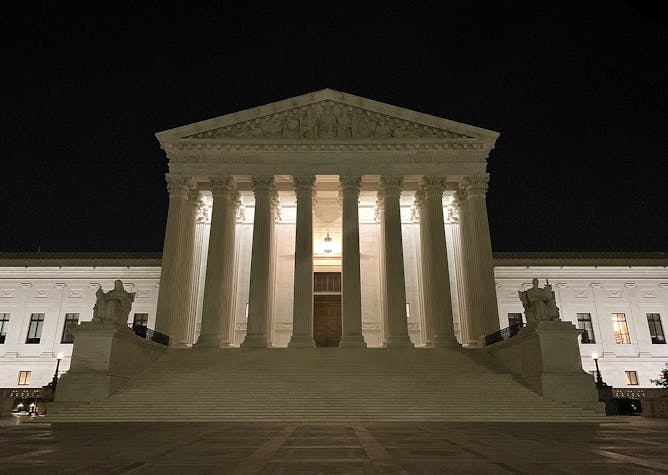|
Top headlines
Lead story
It takes a special kind of skill to be able to write well about the Supreme Court. You need to understand the law, backward and forward, of course. But if we had legal scholars just write about how a decision represents this or that interpretation of the law, the lawyers among our readers would understand what had been decided by the court – but the rest of us would be left wondering what it all really meant.
Not today. Our story about the monumentally important decision in Trump v. United States was written by scholar Claire Wofford, a political scientist and constitutional law scholar at The College of Charleston. For all her degrees and status, Wofford knows how to speak English and not that obscure dialect known as Academic Jargon. Her many stories this year for us about this case, beginning with lower court decisions and culminating yesterday with the long-awaited decision from the high court, are models of engaging, useful storytelling.
And the story Wofford tells today is that of a court handing the former president “what may be the most favorable legal decision he could have reasonably hoped for in his fight against federal prosecution for his attempts to reverse the 2020 election outcome.” The six conservative justices, Wofford writes, stated in their opinion that former presidents have “some immunity for criminal prosecution for official acts” while in office.
“The majority’s use of the word ‘some,’ however,” writes Wofford, “obscures the extent to which its opinion ensures that it will be much more difficult for special counsel Jack Smith to prosecute Trump for actions taken around the 2020 election, much less win that prosecution.”
[ Sign up for our weekly Global Economy & Business newsletter, with interesting perspectives from experts around the world. ]
|

|
Naomi Schalit
Senior Editor, Politics + Democracy
|
|

The U.S. Supreme Court in Washington, D.C.
Allison Edge/iStock/Getty Images Plus
Claire B. Wofford, College of Charleston
The Supreme Court’s decision has major implications for the criminal prosecution of Trump and for the country and how it is governed.
|
Environment + Energy
|
-
Brian Tang, University at Albany, State University of New York
The Category 5 hurricane’s strength and rapid intensification were unusual for a storm so early in the year − and alarming in what’s expected to be a very active Atlantic hurricane season, as a meteorologist explains.
|
|
Economy + Business
|
-
Bedassa Tadesse, University of Minnesota Duluth
It’s not just size. China’s pragmatic trade strategy, which prioritizes meeting the development needs of its trading partners, has played a key role, too.
|
|
Arts + Culture
|
-
Rebecca Scofield, University of Idaho; Elyssa Ford, Northwest Missouri State University
This year is the 41st anniversary of Colorado’s Rocky Mountain Regional Rodeo, continuing its legacy despite anti-LGBTQ+ sentiments.
|
|
Ethics + Religion
|
-
A. Jaime Morales Jr., University of Connecticut
The use of sport as an evangelical tool is not new for the Catholic Church. Pope Pius X welcomed athletes in 1905 for the first international gymnastics competition in the Vatican gardens.
|
|
International
|
-
Mathias Bernard, Université Clermont Auvergne (UCA)
After President Emmanuel Macron dissolved the National Assembly, the first round of the snap legislative elections took place on June 30. Historian Mathias Bernard analyzes what’s at stake.
|
|
Science + Technology
|
-
Erika Nyhus, Bowdoin College
Deciphering how neurons talk to each other by reading the brain’s electrical activity has given scientists insights into memory and conditions like epilepsy and Alzheimer’s.
|
|
Politics + Society
|
-
Lynn Greenky, Syracuse University
Florida and Texas sought to prevent social media companies from deciding which posts can be promoted, demoted or blocked. The Supreme Court said the tech companies can moderate as they please.
-
Jeff Inglis, The Conversation; Naomi Schalit, The Conversation; Amy Lieberman, The Conversation
The dissenting judges argued that the Supreme Court’s decision will dramatically expand the president’s powers while in office.
-
Heather MacIndoe, UMass Boston; Mirae Kim, George Mason University
Two scholars of nonprofits explain what is and isn’t permissible.
|
|
|
|
|
|
| |
| |
| |
| |
|
|